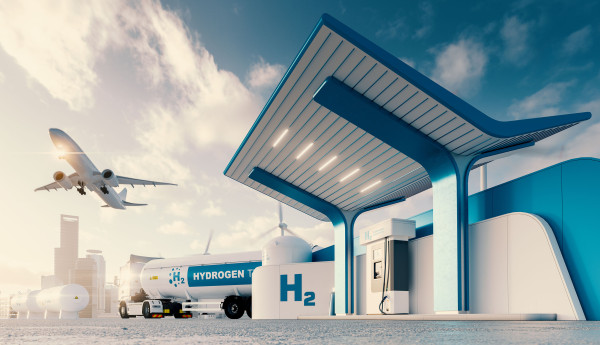Hydrogen report guiding the way for hydrogen integration across New Zealand
Hydrogen may be New Zealand’s fuel of the future. However, this relies on an appraisal and implementation of standards to ensure safety, interoperability and efficiency.

Artist's concept for hydrogen storage, fuel station and plane use.
Standards New Zealand, on behalf of WorkSafe New Zealand - Energy Safety, has conducted a thorough review of technical standards governing the production, distribution, and utilisation of hydrogen. The outcome of this review and three years' work is the release of the hydrogen standards review report in May 2023.
Hydrogen standards review report [PDF, 3.1 MB]
The report contains a standards development implementation strategy that lays out a multi-year prioritisation plan of standards adoptions (direct and modified – where appropriate) to enable the safe integration of hydrogen across New Zealand’s energy landscape.
From advice to action
The project now moves into its next phase, which involves considering the direct-adoption of fifteen international standards, as well as the modified-adoption of an additional eight others. The report also recommends progressive updates to twenty joint-standards (AS/NZS) and the revision of eight New Zealand-specific standards (NZS).
This process is divided into three stages, aligned with the anticipated implementation of hydrogen infrastructure and activities across New Zealand.
The initial stage concentrates on centralised stationary production and storage of hydrogen – this includes the built facilities that will contain this potentially volatile fuel.
The second stage will focus on mobile applications of hydrogen, such as transportation and vehicle refuelling – some of which are already being trialed as concepts across New Zealand.
The third stage addresses large-scale decentralised distribution to ensure accessibility across the motu. The project’s completion is expected by mid-2025.
The report recommends the direct adoption of fifteen international standards, drawing upon good practice already developed by global experts, along with the modified adoption of an additional eight standards to tailor towards New Zealand’s distinct needs. Furthermore, it suggests progressive updates to twenty joint standards (AS/NZS) and the revision of eight New Zealand-specific standards (NZS).
Standards underpinning good practice
This project is closely linked to the regulatory efforts of the Ministry of Business, Innovation, and Employment (MBIE) to establish appropriate regulations for hydrogen. Many health and safety, as well as energy safety, regulations explicitly reference standards when defining compliant activities and practices to ensure safety for all consumers and those working across the emerging industry.
Senior Standards Project Manager Chris Forsman, who has been working with WorkSafe – Energy Safety on this project, outlines the work in the video below.
Chris Forsman on standards for the hydrogen framework(external link)
New Zealand is preparing for the largest energy transition this country has seen in over a hundred years. Hydrogen is set to play a key role in this country’s energy mix and decarbonisation, as we move away from our reliance on fossil fuel.
Hydrogen is naturally occurring, and energy-efficient and emits only water when it is burned.
The cleanest type is classified as “green”, which is produced by splitting water into hydrogen and oxygen via electrolysis powered by renewable energy. This means that no CO2 is created during production.
Where do standards come into this you might wonder?
To enable the safe supply and use of hydrogen across the motu we need to have the right standards and compliance mechanisms in place to ensure safety, interoperability, and efficiency.
Rather than reinvent the wheel, we can identify and adopt international standards already created by subject matter experts and then make modifications to allow them to work locally.
The application of hydrogen cuts across multiple sectors and there are a number of Acts and regulations that play an integral role in the value chain. Regulation often uses standards as a benchmark for good practice.
For the hydrogen framework we’ll be looking at three stages. Firstly, stationary energy and storage – the built facilities that need to safely contain this potentially volatile fuel.
Secondly, how hydrogen will be used across semi-centralised distribution, namely the existing road and rail networks.
The third stage concerns decentralised hydrogen distribution and blending hydrogen and biomethane into the existing natural gas network.
While the focus may be on the energy sector, it’s important to be mindful of how our networks and facilities will be built and adapted to store and distribute hydrogen to make it successful and safe.
Standards can help play a part in scaling and implementing tried and tested technologies and new innovations to ultimately support big impactful change.
